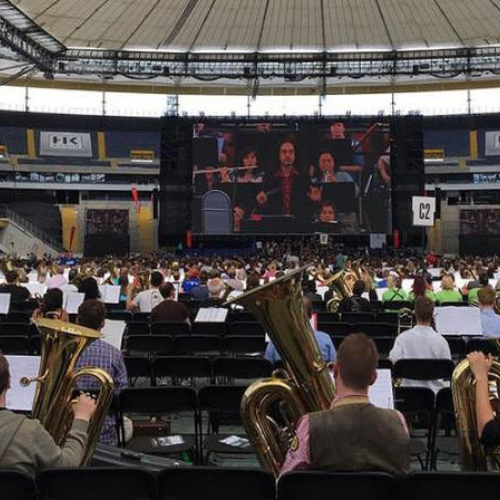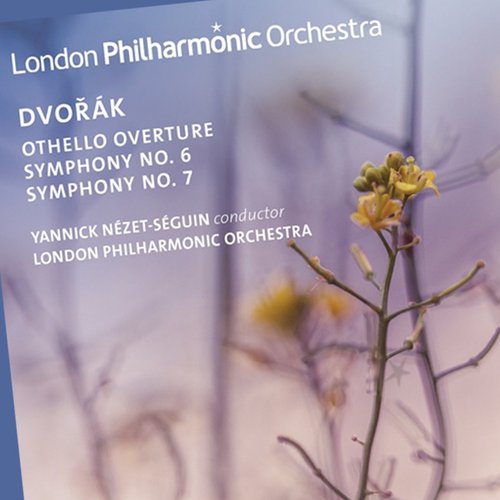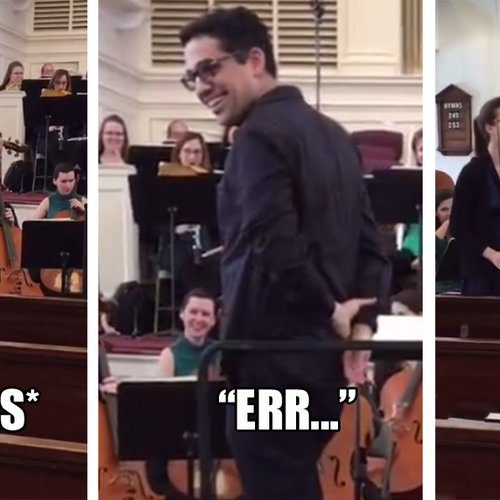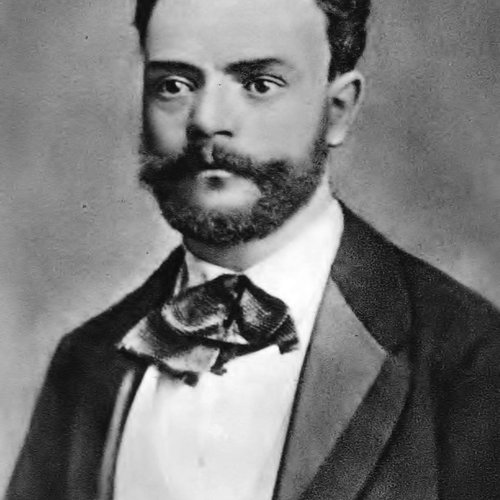Dvořák: A Life
Success came late to the proud Czech composer, Antonin Dvořák, who became a celebrity in the USA but still told a friend, “I shall remain what I was: a simple musician”
Picture an idealised version of a town in 1920s North Yorkshire, complete with cobbled streets and cloth-capped folks ambling about their business. Thanks to a long-running series of TV ads for a well-known bread company, this image was burnt into the minds of the nation.
But what made it indelible was the sound of a brass band intoning a hauntingly nostalgic tune. That melody, with its tantalising blend of contentment and a tinge of regret, seemed to sit perfectly with the mood of the times. Yet it has nothing whatsoever to do with northern England, nor brass bands – it had in fact been written in New York in 1893 as the slow movement to a symphony. The name of the piece’s composer? Antonín Dvořák.
You shouldn’t be too hard on yourself if you didn’t spot the advert’s celebrated anachronisms. But the geographical and musical confusions go further. At the time he wrote the symphony, Dvořák, who was in the USA and under contract to his hosts, wanted to find a way of composing something that would sound as though it had sprung directly from the “Land Of The Free”, yet remain true to his Czechoslovak musical roots.
He found the solution in a simple five-note or “pentatonic” scale that is characteristic of the folk music of both nations, and therefore hoodwinked the two countries into thinking it had been composed for them. Yet the pentatonic scale is also a common denominator of indigenous music from Shanghai to Moscow to Leeds, and this is what gives his unforgettable melody its universality.
But we are getting ahead of ourselves. Dvořák‘s best music is so widely known and appreciated today that we tend to assume he must have burst upon the scene, Brahms-like, churning out masterpieces from the word go.
Yet nothing could be further from the truth. Even at the height of his fame, Dvořák found himself (and his music) labelled by the great conductor Hans von Bülow as “the peasant in a frock-coat”.
And no wonder. Born the eldest son of an innkeeper, whose ambitions for the boy went no further than a career in butchery, the idea that Dvořák would not only inherit the musical mantle of Bedrich Smetana (composer of the popular opera The Bartered Bride and orchestral Vltava) but also surpass him would have seemed risible.
Following an entirely unremarkable education, Dvořák left home in his mid-teens determined to make his way as a musician, but with little more than his skills as a violinist and violist to recommend him.
He received the necessary specialist training at the Prague Organ School while eking out an existence playing in a local band, and subsequently spent a decade with the Prague National Theatre Orchestra (1861-71) as a violist, playing under Smetana’s direction.
In his spare time, Dvořák wrote a number of highly ambitious large-scale pieces, including his first two symphonies, whose indulgently expansionist treatment of less than first-rate ideas went unperformed until 1936 and 1888 respectively. Destroying much of what he composed at this time, Dvořák said dejectedly: “I always have enough paper to make a fire.”
The breakthrough came in 1873 when the 32-year-old finally gave up scraping in the opera pit and took an organist’s post at St Adalbert’s in Prague. Inspired by the new surroundings, Dvořák composed his now-forgotten cantata, The Heirs Of The White Mountain, swiftly followed by a Third Symphony (premiered under Smetana’s direction). Both pieces won considerable public approval at the time, and by the end of the 1870s, he had leapt to international prominence with dizzying speed.
Barely known outside his homeland beforehand, Dvořák became a household name throughout Europe thanks to his first set of Slavonic Dances (1878). The lifelong friendship and influence of Brahms was now to prove crucial, especially as it was he who secured the Czechoslovak composer a contract with Fritz Simrock, a German music publisher.
Dvořák's relationship with Simrock was decidedly fraught at times. The proud and plain-speaking composer, who was also a devout Catholic, would not countenance any musical suggestions from his publisher, and was passionately nationalistic – “Don’t make fun of my Czech brothers and don’t feel sorry for me either!”
For his part, Simrock continually walked a financial tightrope between the huge losses he made on Dvořák’s large-scale symphonic scores and the small fortunes that resulted from such lighter fare as the Slavonic Dances and the G flat major Humoreske. Dvořák also enjoyed success in his homeland as an opera composer, an area of his output that remains under-appreciated today in the West.
As his reputation spread, so Dvořák was invited to make concert appearances abroad, especially in England during the 1880s and 1890s. For one particular performance of the Sixth Symphony, the 27-year-old Edward Elgar was playing in the first violins.
“I wish you could hear Dvořák‘s music,” he excitedly reported to a friend. “It is simply ravishing, so tuneful and clever, and the orchestration is wonderful. I simply cannot describe it; it must be heard.”
It was also during this period that Dvořák first met Tchaikovsky, with whom he established an instant rapport. He was sailing on an unprecedented tide of popular support, and so it may not be entirely surprising that he should now produce a work whose imposing rigour and breathtaking invention surpassed anything he had so far produced: the Seventh Symphony.
The Seventh was the first major work openly to display Dvořák‘s musical debt to Brahms, particularly in the wistful Scherzo third movement. Indeed, contemporary critics generally found it a finer work than Brahms’s own recently completed Third Symphony.
Dvořák squeezed 6000 Deutschmarks out of Simrock for the work, which he himself declared “fit to shake the world” and having been inspired by “God, love and motherland”.
Along with the orchestral Symphonic Variations and F minor Piano Trio, it also belongs to a dark period that Dvořák described as one of “doubt, defiance, silent grief and resignation”.
The contrast between the Sturm und Drang intensity of the Seventh Symphony and the gentle rustic innocence and carefree charm of its successor could hardly be more marked. Simrock only offered 1000 Deutschmarks for the Eighth, so Dvořák promptly sold it to the English publisher Novello instead.
If the playful variations of the finale arguably fail to live up to the expectations raised by the first two movements, all sins (if such they be) are quickly forgiven in the context of one of the most infectiously tuneful works in the symphonic repertoire.
Shortly after, Dvořák returned to the exuberant tunefulness and sparkling invention of the Slavonic Dances with his Carnival Overture, an exhilarating, helter-skelter ride of orchestral bravado and unquenchable high spirits. Throughout the piece, as the distinguished scholar Julius Harrison memorably noted, “...the woodwind, brass and percussion seem intent on slaying each other, so desperate is their fight for survival, so heartless their conduct towards the strings”.
This riot of an orchestral showpiece was dedicated to the University of Prague, which had recently made Dvořák an honorary Doctor of Philosophy.
During the early 1890s, he achieved celebrity status during two protracted visits to North America. Dvořák also accepted the post of Director of New York’s National Conservatory of Music for two years from 1892.
For doing so, and also directing several concerts of his own compositions, he received a small fortune from Jeanette M Thurber, a millionaire arts patron. He responded in kind with the masterly and indelibly tuneful Symphony No.9 From The New World which was to become Hovis’s theme tune some 80 years later.
In 1895, Dvořák returned for good to his homeland, where he set to work on a series of orchestral symphonic poems based on singularly gruesome stories, including The Water Goblin, The Noonday Witch, The Wood Dove and The Golden Spinning-Wheel.
He produced one last popular barnstormer in the form of his Cello Concerto, and the operas The Devil And Kate, Rusalka and Armida. It was during the premiere of the latter in March 1904 that he suddenly fell ill with kidney disease, and after a rapid deterioration in his health, died of a heart attack on May Day, aged 63.
Retaining his modesty and humility to the end, Dvořák reflected in a letter to his friend, the composer-conductor Bohumil Fidler: “I am just a plain Czech musician, disliking such exaggerated humility and despite the fact that I have moved a little in the great musical world, I shall remain just what I was: a simple Czech musician.”








